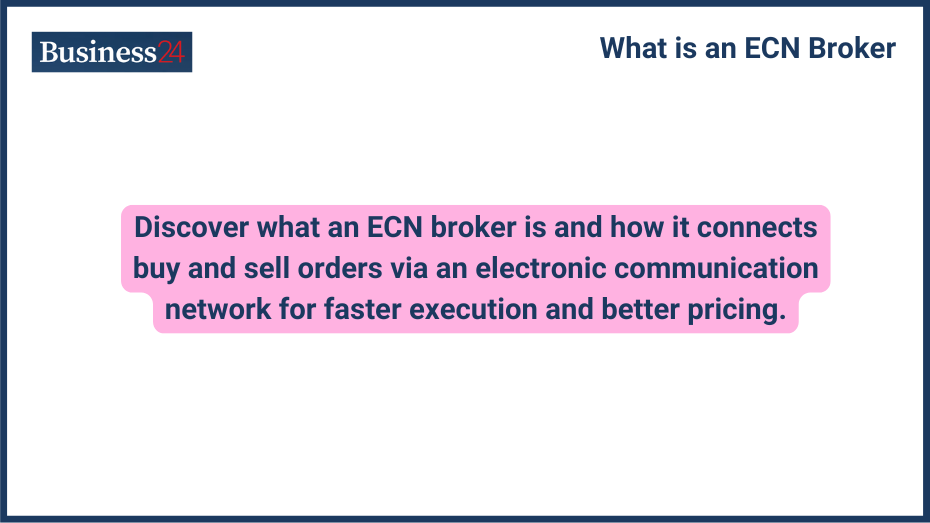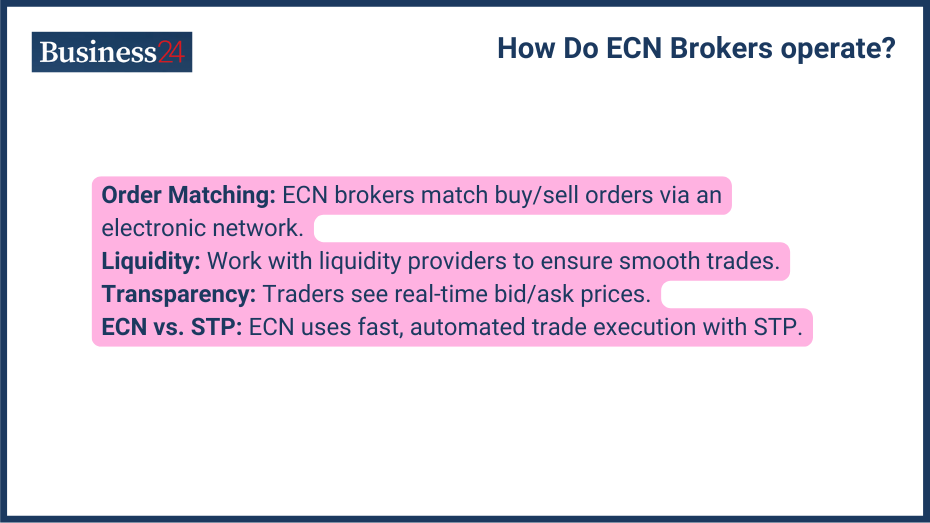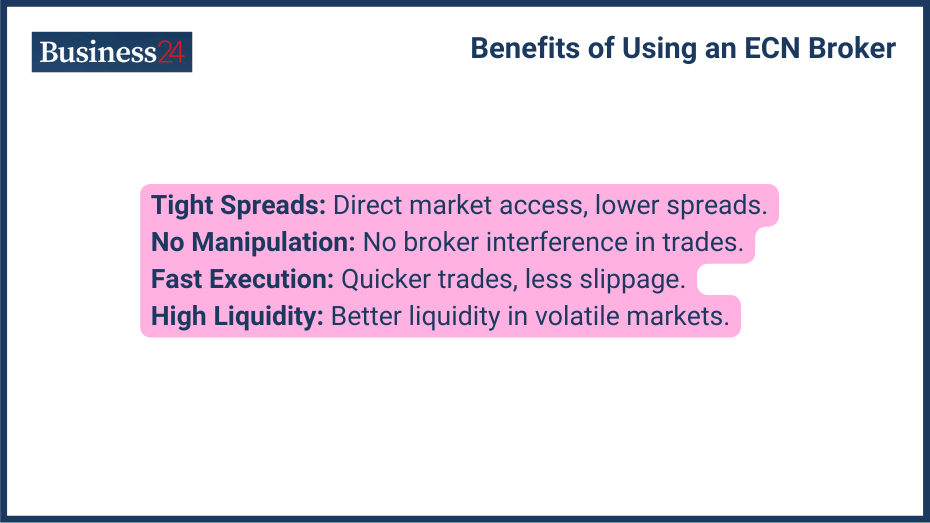
Discover what an ECN broker is and how it connects buy and sell orders via an electronic communication network for faster execution and better pricing.
You might not have heard of ECN brokers as a specific term, but it is an important part of the market. ECN brokers, or Electronic Communication Network brokers, are online brokerages that provide direct access to the electronic communication networks (ECNs) used by institutional investors and other professional traders. ECN brokers facilitate matching buy and sell orders directly between other market participants.
ECN brokers offer their clients direct access to the electronic communication networks where institutional investors and other professional traders buy and sell securities. Your orders are routed directly to the market, bypassing the broker’s trading desk. This could lead to better prices and faster execution speeds.
Role Of ECN Broker
ECN brokers are widely used in both equity and currency markets. They provide a transparent and efficient way for traders to buy and sell securities, particularly for high-frequency traders and other sophisticated investors who require fast execution and low transaction costs.
Traditional brokers act as counterparties to your trades, meaning they buy or sell securities against you. This can introduce potential conflicts of interest and may lead to less favorable pricing. ECN brokers, on the other hand, simply facilitate the matching of orders between other market participants, eliminating the potential for conflicts of interest.
How Do ECN Brokers operate?

ECN broker operates through the following methods:
- Order matching through an electronic communication network: ECN brokers use sophisticated technology to match buy and sell orders from their clients with those of other market participants. This is done through an electronic communication network, where traders can post their buy and sell orders anonymously. The ECN broker acts as a middleman, facilitating the matching of orders and ensuring that trades are executed at the best available price.
- Relationship between ECN brokers, liquidity providers, and traders: These brokers work closely with liquidity providers, such as market makers and institutional investors, to ensure sufficient liquidity in the market. Liquidity providers provide bids and ask for quotes for securities, which allow traders to buy and sell at specific prices. ECN brokers then match buy and sell orders from their clients with the quotes provided by liquidity providers.
- Transparency in pricing and trade execution: Clients can see the best bid and ask prices for a particular security and the size of the currently available orders. This transparency allows traders to make informed decisions and avoid being taken advantage of by market makers. They offer a high degree of transparency in pricing and trade execution.
- Differences between ECN and STP (Straight Through Processing) models: ECN brokers often use the Straight Through Processing (STP) model to execute trades. This means that orders are routed directly to the market without manual intervention. This can lead to faster execution speeds and lower transaction costs. However, some ECN brokers may use a hybrid model combining STP elements and traditional order routing.
Benefits of Using an ECN Broker

Here are some of the benefits of using an ECN broker:
- Tight spreads and direct access to market prices
The main reason professional traders choose ECN brokers is that they offer tighter spreads than traditional brokers. This is because ECN brokers provide direct access to the market, allowing traders to buy and sell at the best available prices. Traditional brokers may add a spread to their quotes, reducing the profitability of trades.
- Avoidance of broker intervention or manipulation
The trading process with an ECN broker becomes smooth because it eliminates potential conflicts of interest and reduces the risk of manipulation. Traditional brokers may be incentivized to execute trades in a way that benefits them rather than their clients. ECN brokers, on the other hand, simply facilitate the matching of orders between other market participants.
- Faster trade execution and reduced slippage
ECN brokers can offer faster trade execution speeds than traditional brokers. This is because orders are routed directly to the market, bypassing the broker’s trading desk. This can be particularly important for high-frequency traders who require fast execution to profit from small price movements. Traditional brokers may introduce delays in the execution of trades, which can lead to slippage or the difference between the price you intended to trade at and the price at which the trade was executed.
- Better liquidity during volatile market conditions
One factor for choosing an ECN broker is better liquidity during high swings. ECNs bring together many buyers and sellers, which can help ensure that there is always a market for securities, even during periods of high volatility. Traditional brokers may have limited liquidity, making buying or selling securities during volatile times difficult.
Drawbacks of ECN Brokers
With benefits, there are some drawbacks of ECN brokers:
- Commission fees and trading costs
High commission and trading fees are significant drawbacks of ECN brokers. While the commissions may be lower than those traditional brokers charge, traders should carefully consider the overall cost of trading, including commissions, spreads, and other fees.
- Higher initial deposit requirements
Another problem for limited capital traders may be that ECN brokers may have higher initial deposit requirements than traditional brokers. This is because ECNs are often used by professional traders who trade larger amounts. However, some ECN brokers may offer lower minimum deposit requirements for retail traders.
- Complexity of ECN platforms for beginners
Also, navigation can be hard as ECN platforms can be more complex than traditional trading platforms. Beginners may need help navigating the platform and understanding the various features and tools. This can be especially challenging for traders who are new to the world of online trading. However, many ECN brokers offer educational resources and customer support to help beginners get started.
Characteristics of a Good ECN Broker
If you are looking for a good ECN broker, here are some of the points you can consider:
- Regulation and licensing: A reputable financial authority like the FCA or ASIC should regulate a good ECN broker. This ensures the broker is subject to industry standards and strict regulations and protects your funds and investments.
- Low commissions and tight spreads: Reduced commissions and tighter spreads can significantly lower your overall trading costs, enabling you to keep more profits from each trade. This can be especially important for high-frequency traders or those trading large volumes, as these savings can accumulate and have a noticeable impact on profitability.
- Access to a range of liquidity providers: A reputable ECN broker should have access to a broad network of liquidity providers, including banks, financial institutions, and other market participants. This wide access to liquidity ensures that there is always sufficient market depth for the securities you wish to trade. This not only allows for better execution prices but also minimizes the risk of slippage, especially during times of market volatility or high trading volumes.
- High-quality trading platform and advanced tools: The trading platform an ECN broker offers should be user-friendly and feature-rich, catering to novice and experienced traders. It should provide advanced charting tools, real-time quotes, customizable indicators, and various order types to enhance your trading experience. A reliable platform with fast execution speeds and advanced features can help you make more informed decisions and improve your overall trading performance.
- Reliable customer support and educational resources: A good ECN broker should offer a dedicated and accessible customer support team to address your issues quickly and effectively. Additionally, the broker should provide a wide range of educational resources, including webinars, tutorials, and market analysis, to help traders of all skill levels improve their knowledge.
- Integration of technology for fast execution: ECN brokers should integrate cutting-edge technology to ensure the fastest and most efficient trade execution possible. Look for brokers that offer low-latency trading platforms, which reduce the time between your order submission and its execution. Low-latency execution is crucial, particularly for day traders and scalpers, as it helps minimize the risks associated with price fluctuations during the execution delay, ensuring you enter and exit trades at optimal prices.
ECN vs. Other Broker Types
ECN vs. Market Makers
ECN brokers match orders directly between other market participants, while market makers act as counterparties to your trades. This can lead to different pricing and execution characteristics.
ECN brokers typically offer tighter spreads than market makers, as they do not add their spread to the price. This can lead to lower transaction costs for traders. Additionally, ECN brokers may be able to execute trades faster than market makers, as they do not need to negotiate with a counterparty.
However, market makers can provide liquidity to the market, even during periods of low trading activity. This can be beneficial for traders who want to buy or sell securities at any time.
ECN vs. STP brokers
STP (Straight Through Processing) brokers also route orders directly to the market. However, STP brokers may have additional layers of processing or routing, which can introduce potential delays or slippage. ECN brokers typically offer more direct access to the market and may have faster execution speeds.
Choosing the Right ECN Broker
Key factors: spreads, commissions, execution speed
When selecting an ECN broker, it’s essential to evaluate several critical factors, such as spreads, commissions, and execution speed. Tight spreads are crucial for minimizing the cost of each trade, especially for high-frequency traders, as they allow for better entry and exit points in the market. Low commissions are equally important because they directly impact your profitability, particularly if you’re executing many trades.
Fast execution times are a non-negotiable element for any serious trader. The quicker your trades are executed, the less risk you face from price changes between placing the order and filling it. Therefore, prioritizing these factors ensures maximizing profitability while minimizing trading costs.
Regulatory standing and reviews
Always verify that the ECN broker you’re considering is regulated by a respected financial authority, such as the FCA (Financial Conduct Authority), ASIC (Australian Securities and Investments Commission), or another similarly credible body. Regulatory oversight guarantees that the broker operates under established legal and ethical guidelines, protecting against fraud or financial misconduct.
Furthermore, it’s prudent to explore customer reviews and testimonials to gauge the experiences of other traders. Feedback from current or former clients can reveal important insights about the broker’s reliability, customer service, and overall trading environment. A broker with consistently positive reviews is more likely to offer a trustworthy and dependable service.
Availability of a demo account and user experience testing
Most top-tier ECN brokers provide demo accounts, which are invaluable for novice and experienced traders. These accounts allow you to engage in simulated trading using virtual funds, exploring the broker’s platform, testing different strategies, and familiarizing yourself with the trading interface—all without risking real capital. It’s also an excellent way to test the broker’s execution speed, platform features, and customer support responsiveness.
Before committing to a live account, a demo account allows you to assess the user experience, ensuring the platform meets your trading needs and offers a seamless, efficient experience.
Disclaimer
eToro is a multi-asset platform which offers both investing in stocks and cryptoassets, as well as trading CFDs.
Please note that CFDs are complex instruments and come with a high risk of losing money rapidly due to leverage. 61% of retail investor accounts lose money when trading CFDs with this provider. You should consider whether you understand how CFDs work, and whether you can afford to take the high risk of losing your money
This communication is intended for information and educational purposes only and should not be considered investment advice or investment recommendation. Past performance is not an indication of future results.
Copy Trading does not amount to investment advice. The value of your investments may go up or down. Your capital is at risk.
Crypto assets are complex and carry a high risk of volatility and loss. Trading or investing in crypto assets may not be suitable for all investors. Take 2 mins to learn more
eToro USA LLC does not offer CFDs and makes no representation and assumes no liability as to the accuracy or completeness of the content of this publication, which has been prepared by our partner utilizing publicly available non-entity specific information about eToro.
